A Deep Dive into Montessori's Ideas for Education of Young Children
VerifiedAdded on 2021/04/24
|10
|2781
|247
Essay
AI Summary
This essay provides a comprehensive analysis of Maria Montessori's educational ideas, focusing on key concepts such as respect for the child, the absorbent mind, sensitive periods, the prepared environment, and autoeducation. It explores the core principles of the Montessori approach, including the importance of independence, observation, and a structured learning environment. The essay examines the relevance of Montessori's theories in contemporary early childhood education, highlighting its global adoption and impact on child development. It discusses the Montessori theory's emphasis on self-discovery, creativity, and social adeptness, and how it prepares children for the future. The essay also addresses criticisms and advantages of the Montessori method, comparing it to traditional educational approaches, and providing an overview of the Montessori approach, its history, and its impact on education. Finally, it explores the evolution of Montessori education for different age groups, including adolescents, and its continued relevance and influence in the modern world.
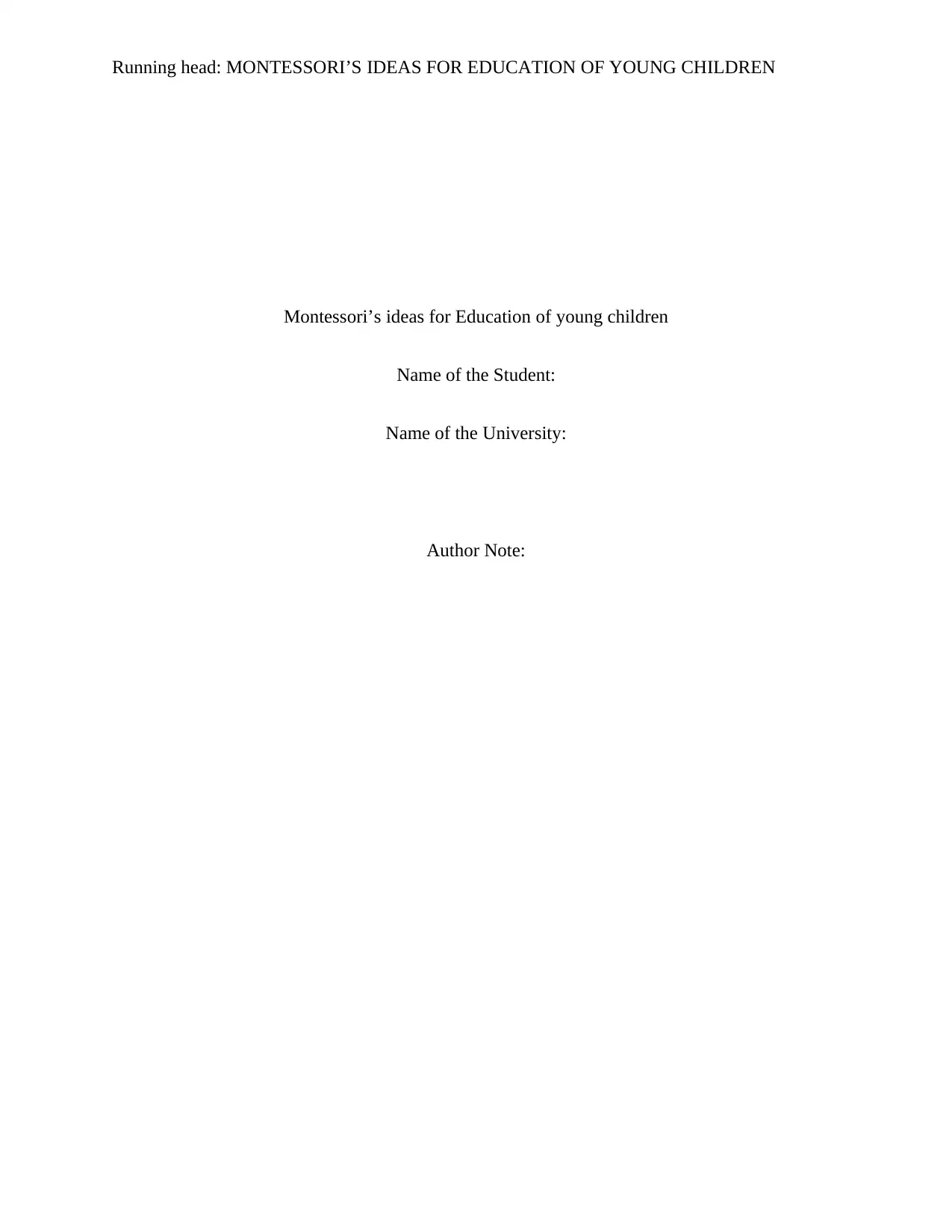
Running head: MONTESSORI’S IDEAS FOR EDUCATION OF YOUNG CHILDREN
Montessori’s ideas for Education of young children
Name of the Student:
Name of the University:
Author Note:
Montessori’s ideas for Education of young children
Name of the Student:
Name of the University:
Author Note:
Paraphrase This Document
Need a fresh take? Get an instant paraphrase of this document with our AI Paraphraser
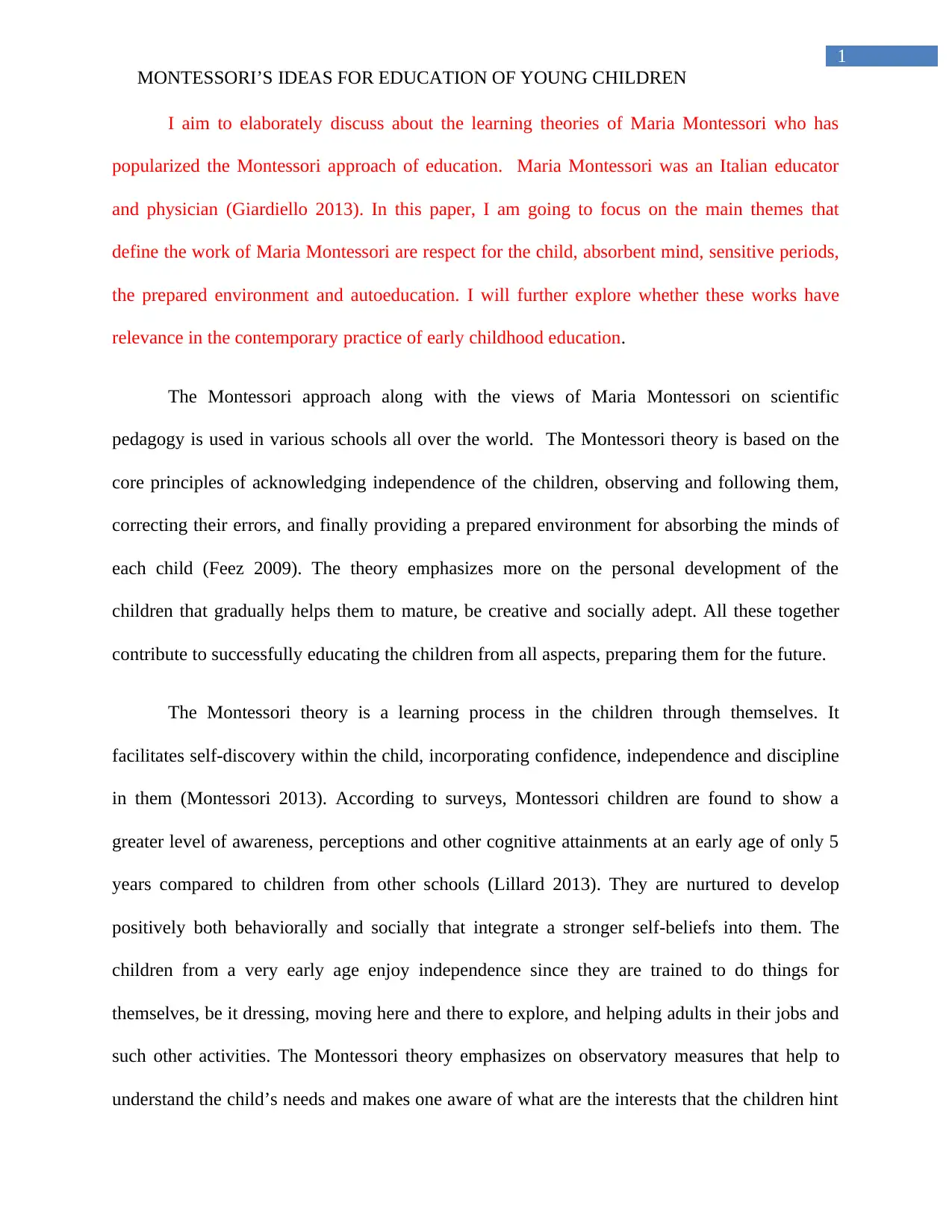
1
MONTESSORI’S IDEAS FOR EDUCATION OF YOUNG CHILDREN
I aim to elaborately discuss about the learning theories of Maria Montessori who has
popularized the Montessori approach of education. Maria Montessori was an Italian educator
and physician (Giardiello 2013). In this paper, I am going to focus on the main themes that
define the work of Maria Montessori are respect for the child, absorbent mind, sensitive periods,
the prepared environment and autoeducation. I will further explore whether these works have
relevance in the contemporary practice of early childhood education.
The Montessori approach along with the views of Maria Montessori on scientific
pedagogy is used in various schools all over the world. The Montessori theory is based on the
core principles of acknowledging independence of the children, observing and following them,
correcting their errors, and finally providing a prepared environment for absorbing the minds of
each child (Feez 2009). The theory emphasizes more on the personal development of the
children that gradually helps them to mature, be creative and socially adept. All these together
contribute to successfully educating the children from all aspects, preparing them for the future.
The Montessori theory is a learning process in the children through themselves. It
facilitates self-discovery within the child, incorporating confidence, independence and discipline
in them (Montessori 2013). According to surveys, Montessori children are found to show a
greater level of awareness, perceptions and other cognitive attainments at an early age of only 5
years compared to children from other schools (Lillard 2013). They are nurtured to develop
positively both behaviorally and socially that integrate a stronger self-beliefs into them. The
children from a very early age enjoy independence since they are trained to do things for
themselves, be it dressing, moving here and there to explore, and helping adults in their jobs and
such other activities. The Montessori theory emphasizes on observatory measures that help to
understand the child’s needs and makes one aware of what are the interests that the children hint
MONTESSORI’S IDEAS FOR EDUCATION OF YOUNG CHILDREN
I aim to elaborately discuss about the learning theories of Maria Montessori who has
popularized the Montessori approach of education. Maria Montessori was an Italian educator
and physician (Giardiello 2013). In this paper, I am going to focus on the main themes that
define the work of Maria Montessori are respect for the child, absorbent mind, sensitive periods,
the prepared environment and autoeducation. I will further explore whether these works have
relevance in the contemporary practice of early childhood education.
The Montessori approach along with the views of Maria Montessori on scientific
pedagogy is used in various schools all over the world. The Montessori theory is based on the
core principles of acknowledging independence of the children, observing and following them,
correcting their errors, and finally providing a prepared environment for absorbing the minds of
each child (Feez 2009). The theory emphasizes more on the personal development of the
children that gradually helps them to mature, be creative and socially adept. All these together
contribute to successfully educating the children from all aspects, preparing them for the future.
The Montessori theory is a learning process in the children through themselves. It
facilitates self-discovery within the child, incorporating confidence, independence and discipline
in them (Montessori 2013). According to surveys, Montessori children are found to show a
greater level of awareness, perceptions and other cognitive attainments at an early age of only 5
years compared to children from other schools (Lillard 2013). They are nurtured to develop
positively both behaviorally and socially that integrate a stronger self-beliefs into them. The
children from a very early age enjoy independence since they are trained to do things for
themselves, be it dressing, moving here and there to explore, and helping adults in their jobs and
such other activities. The Montessori theory emphasizes on observatory measures that help to
understand the child’s needs and makes one aware of what are the interests that the children hint
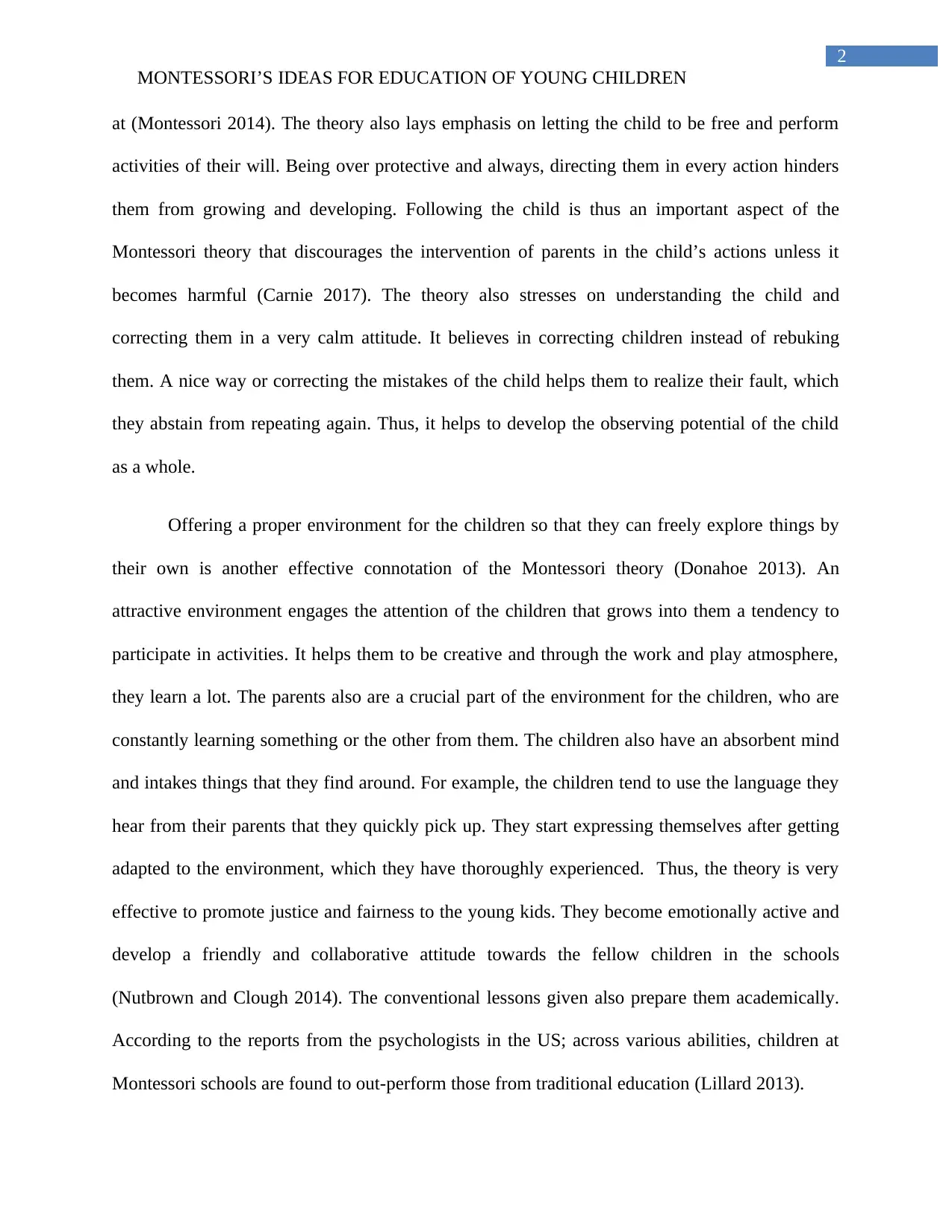
2
MONTESSORI’S IDEAS FOR EDUCATION OF YOUNG CHILDREN
at (Montessori 2014). The theory also lays emphasis on letting the child to be free and perform
activities of their will. Being over protective and always, directing them in every action hinders
them from growing and developing. Following the child is thus an important aspect of the
Montessori theory that discourages the intervention of parents in the child’s actions unless it
becomes harmful (Carnie 2017). The theory also stresses on understanding the child and
correcting them in a very calm attitude. It believes in correcting children instead of rebuking
them. A nice way or correcting the mistakes of the child helps them to realize their fault, which
they abstain from repeating again. Thus, it helps to develop the observing potential of the child
as a whole.
Offering a proper environment for the children so that they can freely explore things by
their own is another effective connotation of the Montessori theory (Donahoe 2013). An
attractive environment engages the attention of the children that grows into them a tendency to
participate in activities. It helps them to be creative and through the work and play atmosphere,
they learn a lot. The parents also are a crucial part of the environment for the children, who are
constantly learning something or the other from them. The children also have an absorbent mind
and intakes things that they find around. For example, the children tend to use the language they
hear from their parents that they quickly pick up. They start expressing themselves after getting
adapted to the environment, which they have thoroughly experienced. Thus, the theory is very
effective to promote justice and fairness to the young kids. They become emotionally active and
develop a friendly and collaborative attitude towards the fellow children in the schools
(Nutbrown and Clough 2014). The conventional lessons given also prepare them academically.
According to the reports from the psychologists in the US; across various abilities, children at
Montessori schools are found to out-perform those from traditional education (Lillard 2013).
MONTESSORI’S IDEAS FOR EDUCATION OF YOUNG CHILDREN
at (Montessori 2014). The theory also lays emphasis on letting the child to be free and perform
activities of their will. Being over protective and always, directing them in every action hinders
them from growing and developing. Following the child is thus an important aspect of the
Montessori theory that discourages the intervention of parents in the child’s actions unless it
becomes harmful (Carnie 2017). The theory also stresses on understanding the child and
correcting them in a very calm attitude. It believes in correcting children instead of rebuking
them. A nice way or correcting the mistakes of the child helps them to realize their fault, which
they abstain from repeating again. Thus, it helps to develop the observing potential of the child
as a whole.
Offering a proper environment for the children so that they can freely explore things by
their own is another effective connotation of the Montessori theory (Donahoe 2013). An
attractive environment engages the attention of the children that grows into them a tendency to
participate in activities. It helps them to be creative and through the work and play atmosphere,
they learn a lot. The parents also are a crucial part of the environment for the children, who are
constantly learning something or the other from them. The children also have an absorbent mind
and intakes things that they find around. For example, the children tend to use the language they
hear from their parents that they quickly pick up. They start expressing themselves after getting
adapted to the environment, which they have thoroughly experienced. Thus, the theory is very
effective to promote justice and fairness to the young kids. They become emotionally active and
develop a friendly and collaborative attitude towards the fellow children in the schools
(Nutbrown and Clough 2014). The conventional lessons given also prepare them academically.
According to the reports from the psychologists in the US; across various abilities, children at
Montessori schools are found to out-perform those from traditional education (Lillard 2013).
⊘ This is a preview!⊘
Do you want full access?
Subscribe today to unlock all pages.

Trusted by 1+ million students worldwide
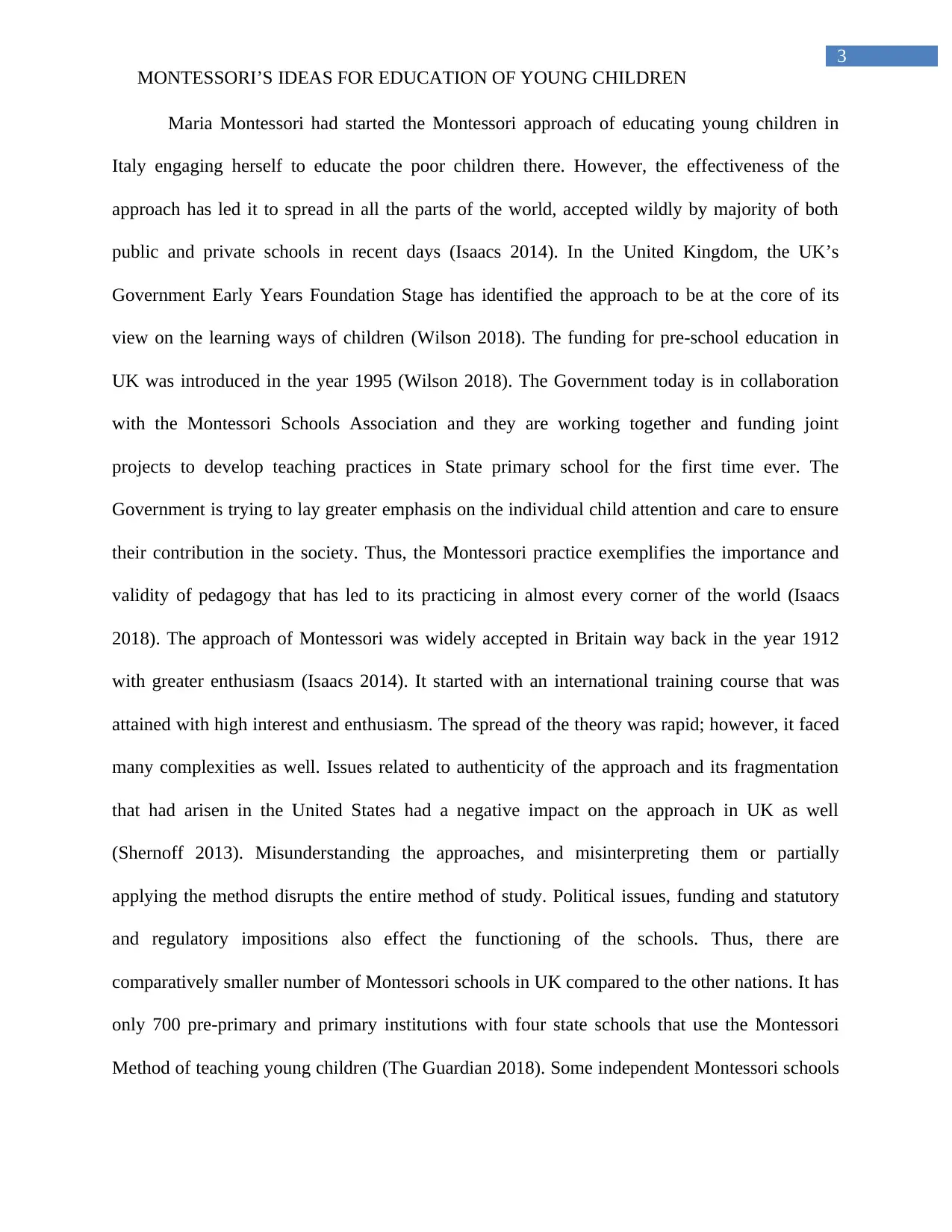
3
MONTESSORI’S IDEAS FOR EDUCATION OF YOUNG CHILDREN
Maria Montessori had started the Montessori approach of educating young children in
Italy engaging herself to educate the poor children there. However, the effectiveness of the
approach has led it to spread in all the parts of the world, accepted wildly by majority of both
public and private schools in recent days (Isaacs 2014). In the United Kingdom, the UK’s
Government Early Years Foundation Stage has identified the approach to be at the core of its
view on the learning ways of children (Wilson 2018). The funding for pre-school education in
UK was introduced in the year 1995 (Wilson 2018). The Government today is in collaboration
with the Montessori Schools Association and they are working together and funding joint
projects to develop teaching practices in State primary school for the first time ever. The
Government is trying to lay greater emphasis on the individual child attention and care to ensure
their contribution in the society. Thus, the Montessori practice exemplifies the importance and
validity of pedagogy that has led to its practicing in almost every corner of the world (Isaacs
2018). The approach of Montessori was widely accepted in Britain way back in the year 1912
with greater enthusiasm (Isaacs 2014). It started with an international training course that was
attained with high interest and enthusiasm. The spread of the theory was rapid; however, it faced
many complexities as well. Issues related to authenticity of the approach and its fragmentation
that had arisen in the United States had a negative impact on the approach in UK as well
(Shernoff 2013). Misunderstanding the approaches, and misinterpreting them or partially
applying the method disrupts the entire method of study. Political issues, funding and statutory
and regulatory impositions also effect the functioning of the schools. Thus, there are
comparatively smaller number of Montessori schools in UK compared to the other nations. It has
only 700 pre-primary and primary institutions with four state schools that use the Montessori
Method of teaching young children (The Guardian 2018). Some independent Montessori schools
MONTESSORI’S IDEAS FOR EDUCATION OF YOUNG CHILDREN
Maria Montessori had started the Montessori approach of educating young children in
Italy engaging herself to educate the poor children there. However, the effectiveness of the
approach has led it to spread in all the parts of the world, accepted wildly by majority of both
public and private schools in recent days (Isaacs 2014). In the United Kingdom, the UK’s
Government Early Years Foundation Stage has identified the approach to be at the core of its
view on the learning ways of children (Wilson 2018). The funding for pre-school education in
UK was introduced in the year 1995 (Wilson 2018). The Government today is in collaboration
with the Montessori Schools Association and they are working together and funding joint
projects to develop teaching practices in State primary school for the first time ever. The
Government is trying to lay greater emphasis on the individual child attention and care to ensure
their contribution in the society. Thus, the Montessori practice exemplifies the importance and
validity of pedagogy that has led to its practicing in almost every corner of the world (Isaacs
2018). The approach of Montessori was widely accepted in Britain way back in the year 1912
with greater enthusiasm (Isaacs 2014). It started with an international training course that was
attained with high interest and enthusiasm. The spread of the theory was rapid; however, it faced
many complexities as well. Issues related to authenticity of the approach and its fragmentation
that had arisen in the United States had a negative impact on the approach in UK as well
(Shernoff 2013). Misunderstanding the approaches, and misinterpreting them or partially
applying the method disrupts the entire method of study. Political issues, funding and statutory
and regulatory impositions also effect the functioning of the schools. Thus, there are
comparatively smaller number of Montessori schools in UK compared to the other nations. It has
only 700 pre-primary and primary institutions with four state schools that use the Montessori
Method of teaching young children (The Guardian 2018). Some independent Montessori schools
Paraphrase This Document
Need a fresh take? Get an instant paraphrase of this document with our AI Paraphraser
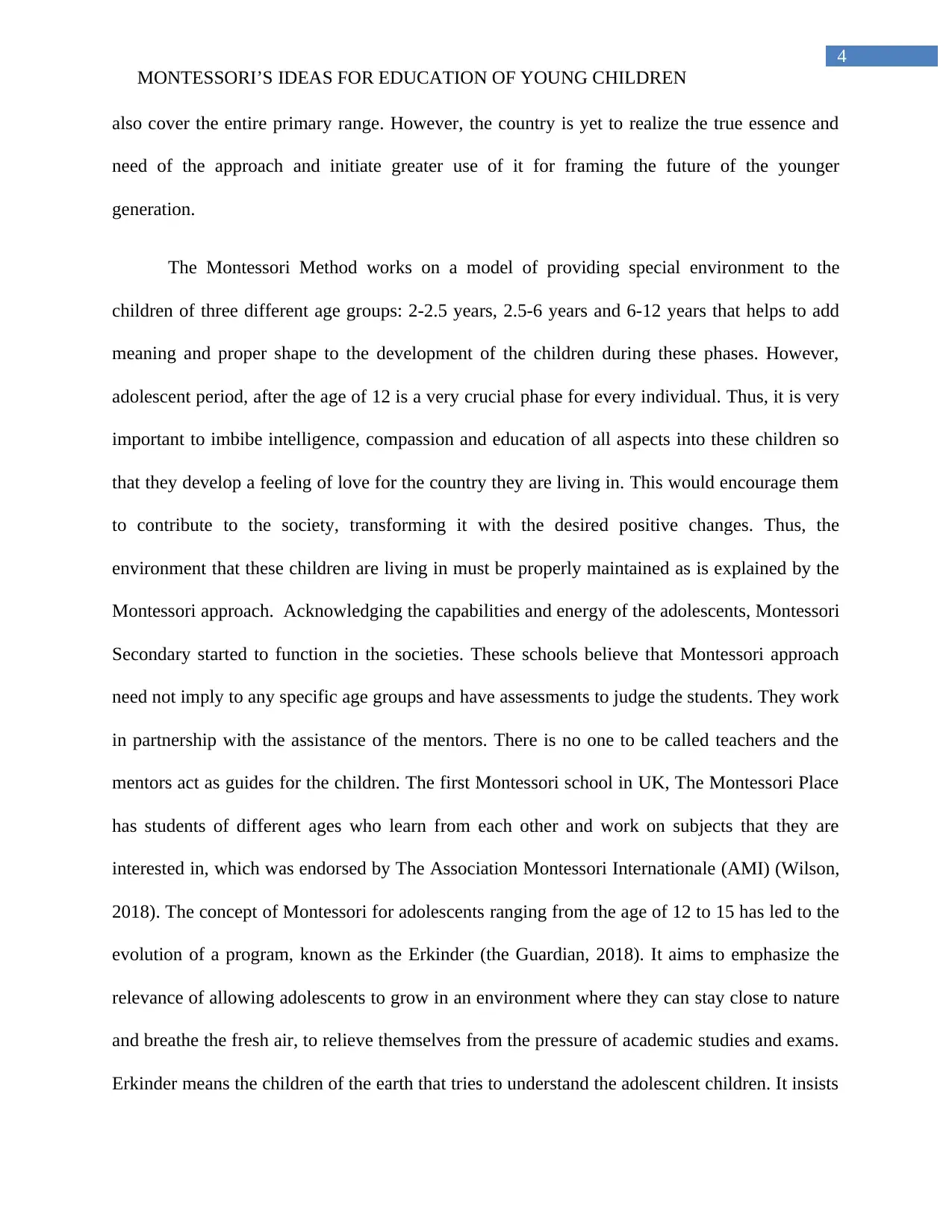
4
MONTESSORI’S IDEAS FOR EDUCATION OF YOUNG CHILDREN
also cover the entire primary range. However, the country is yet to realize the true essence and
need of the approach and initiate greater use of it for framing the future of the younger
generation.
The Montessori Method works on a model of providing special environment to the
children of three different age groups: 2-2.5 years, 2.5-6 years and 6-12 years that helps to add
meaning and proper shape to the development of the children during these phases. However,
adolescent period, after the age of 12 is a very crucial phase for every individual. Thus, it is very
important to imbibe intelligence, compassion and education of all aspects into these children so
that they develop a feeling of love for the country they are living in. This would encourage them
to contribute to the society, transforming it with the desired positive changes. Thus, the
environment that these children are living in must be properly maintained as is explained by the
Montessori approach. Acknowledging the capabilities and energy of the adolescents, Montessori
Secondary started to function in the societies. These schools believe that Montessori approach
need not imply to any specific age groups and have assessments to judge the students. They work
in partnership with the assistance of the mentors. There is no one to be called teachers and the
mentors act as guides for the children. The first Montessori school in UK, The Montessori Place
has students of different ages who learn from each other and work on subjects that they are
interested in, which was endorsed by The Association Montessori Internationale (AMI) (Wilson,
2018). The concept of Montessori for adolescents ranging from the age of 12 to 15 has led to the
evolution of a program, known as the Erkinder (the Guardian, 2018). It aims to emphasize the
relevance of allowing adolescents to grow in an environment where they can stay close to nature
and breathe the fresh air, to relieve themselves from the pressure of academic studies and exams.
Erkinder means the children of the earth that tries to understand the adolescent children. It insists
MONTESSORI’S IDEAS FOR EDUCATION OF YOUNG CHILDREN
also cover the entire primary range. However, the country is yet to realize the true essence and
need of the approach and initiate greater use of it for framing the future of the younger
generation.
The Montessori Method works on a model of providing special environment to the
children of three different age groups: 2-2.5 years, 2.5-6 years and 6-12 years that helps to add
meaning and proper shape to the development of the children during these phases. However,
adolescent period, after the age of 12 is a very crucial phase for every individual. Thus, it is very
important to imbibe intelligence, compassion and education of all aspects into these children so
that they develop a feeling of love for the country they are living in. This would encourage them
to contribute to the society, transforming it with the desired positive changes. Thus, the
environment that these children are living in must be properly maintained as is explained by the
Montessori approach. Acknowledging the capabilities and energy of the adolescents, Montessori
Secondary started to function in the societies. These schools believe that Montessori approach
need not imply to any specific age groups and have assessments to judge the students. They work
in partnership with the assistance of the mentors. There is no one to be called teachers and the
mentors act as guides for the children. The first Montessori school in UK, The Montessori Place
has students of different ages who learn from each other and work on subjects that they are
interested in, which was endorsed by The Association Montessori Internationale (AMI) (Wilson,
2018). The concept of Montessori for adolescents ranging from the age of 12 to 15 has led to the
evolution of a program, known as the Erkinder (the Guardian, 2018). It aims to emphasize the
relevance of allowing adolescents to grow in an environment where they can stay close to nature
and breathe the fresh air, to relieve themselves from the pressure of academic studies and exams.
Erkinder means the children of the earth that tries to understand the adolescent children. It insists
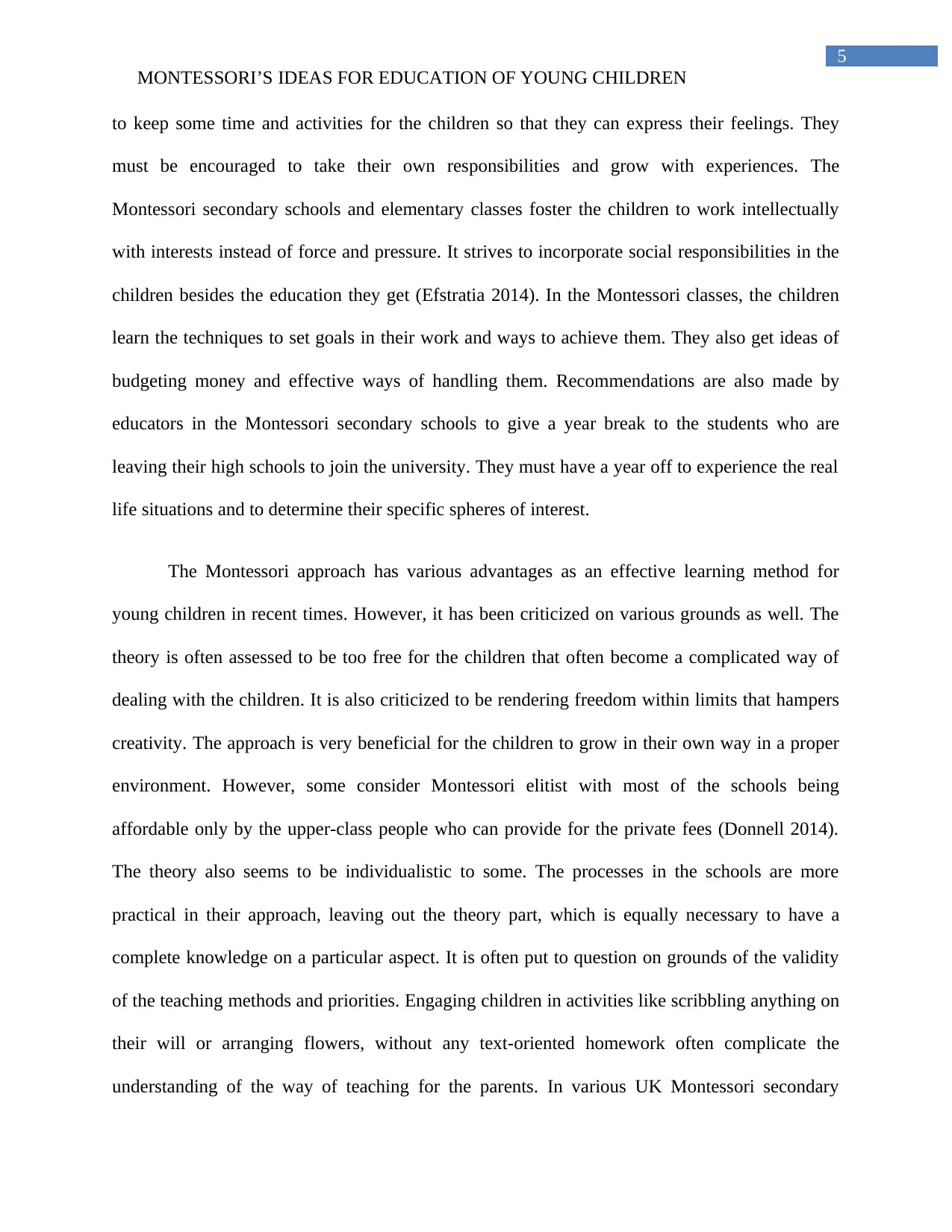
5
MONTESSORI’S IDEAS FOR EDUCATION OF YOUNG CHILDREN
to keep some time and activities for the children so that they can express their feelings. They
must be encouraged to take their own responsibilities and grow with experiences. The
Montessori secondary schools and elementary classes foster the children to work intellectually
with interests instead of force and pressure. It strives to incorporate social responsibilities in the
children besides the education they get (Efstratia 2014). In the Montessori classes, the children
learn the techniques to set goals in their work and ways to achieve them. They also get ideas of
budgeting money and effective ways of handling them. Recommendations are also made by
educators in the Montessori secondary schools to give a year break to the students who are
leaving their high schools to join the university. They must have a year off to experience the real
life situations and to determine their specific spheres of interest.
The Montessori approach has various advantages as an effective learning method for
young children in recent times. However, it has been criticized on various grounds as well. The
theory is often assessed to be too free for the children that often become a complicated way of
dealing with the children. It is also criticized to be rendering freedom within limits that hampers
creativity. The approach is very beneficial for the children to grow in their own way in a proper
environment. However, some consider Montessori elitist with most of the schools being
affordable only by the upper-class people who can provide for the private fees (Donnell 2014).
The theory also seems to be individualistic to some. The processes in the schools are more
practical in their approach, leaving out the theory part, which is equally necessary to have a
complete knowledge on a particular aspect. It is often put to question on grounds of the validity
of the teaching methods and priorities. Engaging children in activities like scribbling anything on
their will or arranging flowers, without any text-oriented homework often complicate the
understanding of the way of teaching for the parents. In various UK Montessori secondary
MONTESSORI’S IDEAS FOR EDUCATION OF YOUNG CHILDREN
to keep some time and activities for the children so that they can express their feelings. They
must be encouraged to take their own responsibilities and grow with experiences. The
Montessori secondary schools and elementary classes foster the children to work intellectually
with interests instead of force and pressure. It strives to incorporate social responsibilities in the
children besides the education they get (Efstratia 2014). In the Montessori classes, the children
learn the techniques to set goals in their work and ways to achieve them. They also get ideas of
budgeting money and effective ways of handling them. Recommendations are also made by
educators in the Montessori secondary schools to give a year break to the students who are
leaving their high schools to join the university. They must have a year off to experience the real
life situations and to determine their specific spheres of interest.
The Montessori approach has various advantages as an effective learning method for
young children in recent times. However, it has been criticized on various grounds as well. The
theory is often assessed to be too free for the children that often become a complicated way of
dealing with the children. It is also criticized to be rendering freedom within limits that hampers
creativity. The approach is very beneficial for the children to grow in their own way in a proper
environment. However, some consider Montessori elitist with most of the schools being
affordable only by the upper-class people who can provide for the private fees (Donnell 2014).
The theory also seems to be individualistic to some. The processes in the schools are more
practical in their approach, leaving out the theory part, which is equally necessary to have a
complete knowledge on a particular aspect. It is often put to question on grounds of the validity
of the teaching methods and priorities. Engaging children in activities like scribbling anything on
their will or arranging flowers, without any text-oriented homework often complicate the
understanding of the way of teaching for the parents. In various UK Montessori secondary
⊘ This is a preview!⊘
Do you want full access?
Subscribe today to unlock all pages.

Trusted by 1+ million students worldwide
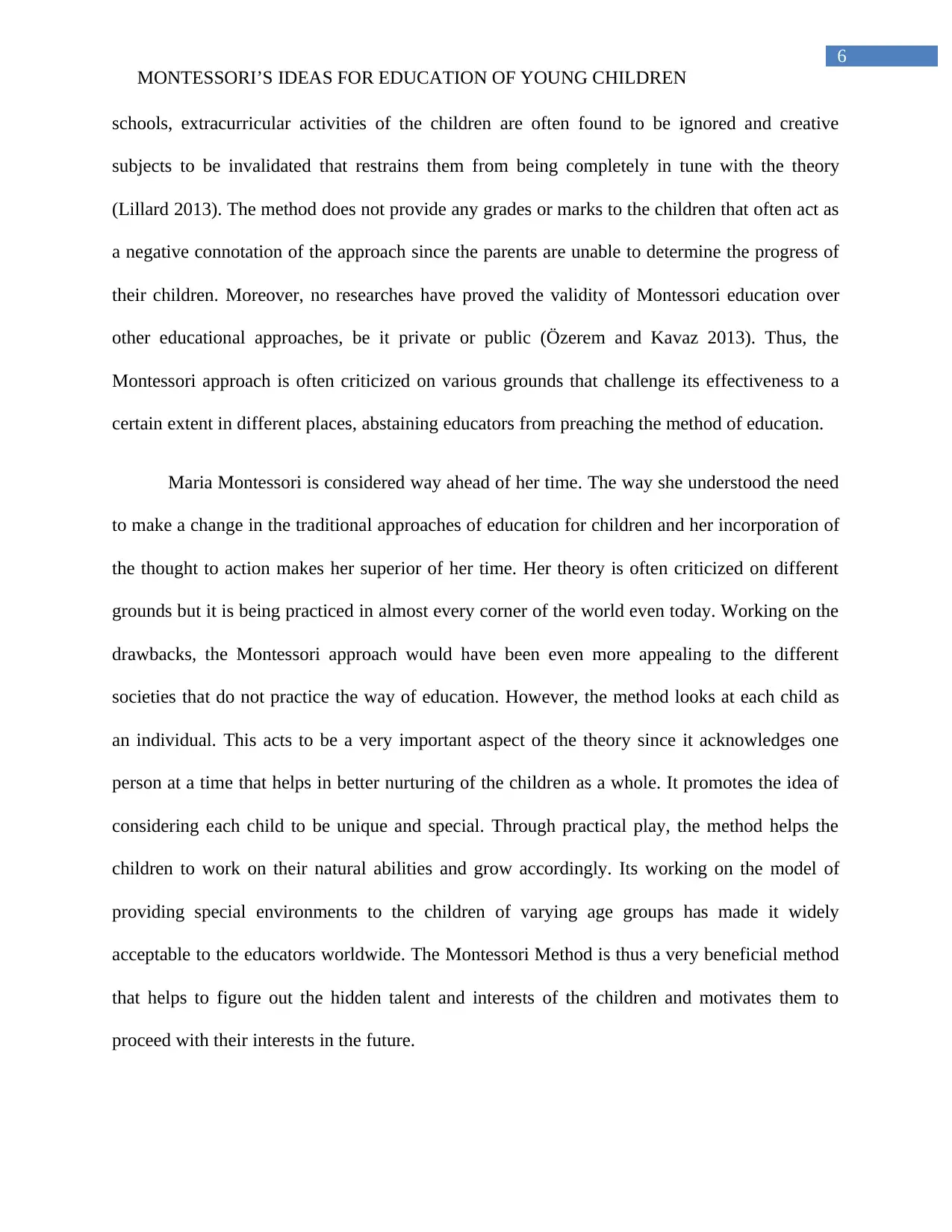
6
MONTESSORI’S IDEAS FOR EDUCATION OF YOUNG CHILDREN
schools, extracurricular activities of the children are often found to be ignored and creative
subjects to be invalidated that restrains them from being completely in tune with the theory
(Lillard 2013). The method does not provide any grades or marks to the children that often act as
a negative connotation of the approach since the parents are unable to determine the progress of
their children. Moreover, no researches have proved the validity of Montessori education over
other educational approaches, be it private or public (Özerem and Kavaz 2013). Thus, the
Montessori approach is often criticized on various grounds that challenge its effectiveness to a
certain extent in different places, abstaining educators from preaching the method of education.
Maria Montessori is considered way ahead of her time. The way she understood the need
to make a change in the traditional approaches of education for children and her incorporation of
the thought to action makes her superior of her time. Her theory is often criticized on different
grounds but it is being practiced in almost every corner of the world even today. Working on the
drawbacks, the Montessori approach would have been even more appealing to the different
societies that do not practice the way of education. However, the method looks at each child as
an individual. This acts to be a very important aspect of the theory since it acknowledges one
person at a time that helps in better nurturing of the children as a whole. It promotes the idea of
considering each child to be unique and special. Through practical play, the method helps the
children to work on their natural abilities and grow accordingly. Its working on the model of
providing special environments to the children of varying age groups has made it widely
acceptable to the educators worldwide. The Montessori Method is thus a very beneficial method
that helps to figure out the hidden talent and interests of the children and motivates them to
proceed with their interests in the future.
MONTESSORI’S IDEAS FOR EDUCATION OF YOUNG CHILDREN
schools, extracurricular activities of the children are often found to be ignored and creative
subjects to be invalidated that restrains them from being completely in tune with the theory
(Lillard 2013). The method does not provide any grades or marks to the children that often act as
a negative connotation of the approach since the parents are unable to determine the progress of
their children. Moreover, no researches have proved the validity of Montessori education over
other educational approaches, be it private or public (Özerem and Kavaz 2013). Thus, the
Montessori approach is often criticized on various grounds that challenge its effectiveness to a
certain extent in different places, abstaining educators from preaching the method of education.
Maria Montessori is considered way ahead of her time. The way she understood the need
to make a change in the traditional approaches of education for children and her incorporation of
the thought to action makes her superior of her time. Her theory is often criticized on different
grounds but it is being practiced in almost every corner of the world even today. Working on the
drawbacks, the Montessori approach would have been even more appealing to the different
societies that do not practice the way of education. However, the method looks at each child as
an individual. This acts to be a very important aspect of the theory since it acknowledges one
person at a time that helps in better nurturing of the children as a whole. It promotes the idea of
considering each child to be unique and special. Through practical play, the method helps the
children to work on their natural abilities and grow accordingly. Its working on the model of
providing special environments to the children of varying age groups has made it widely
acceptable to the educators worldwide. The Montessori Method is thus a very beneficial method
that helps to figure out the hidden talent and interests of the children and motivates them to
proceed with their interests in the future.
Paraphrase This Document
Need a fresh take? Get an instant paraphrase of this document with our AI Paraphraser
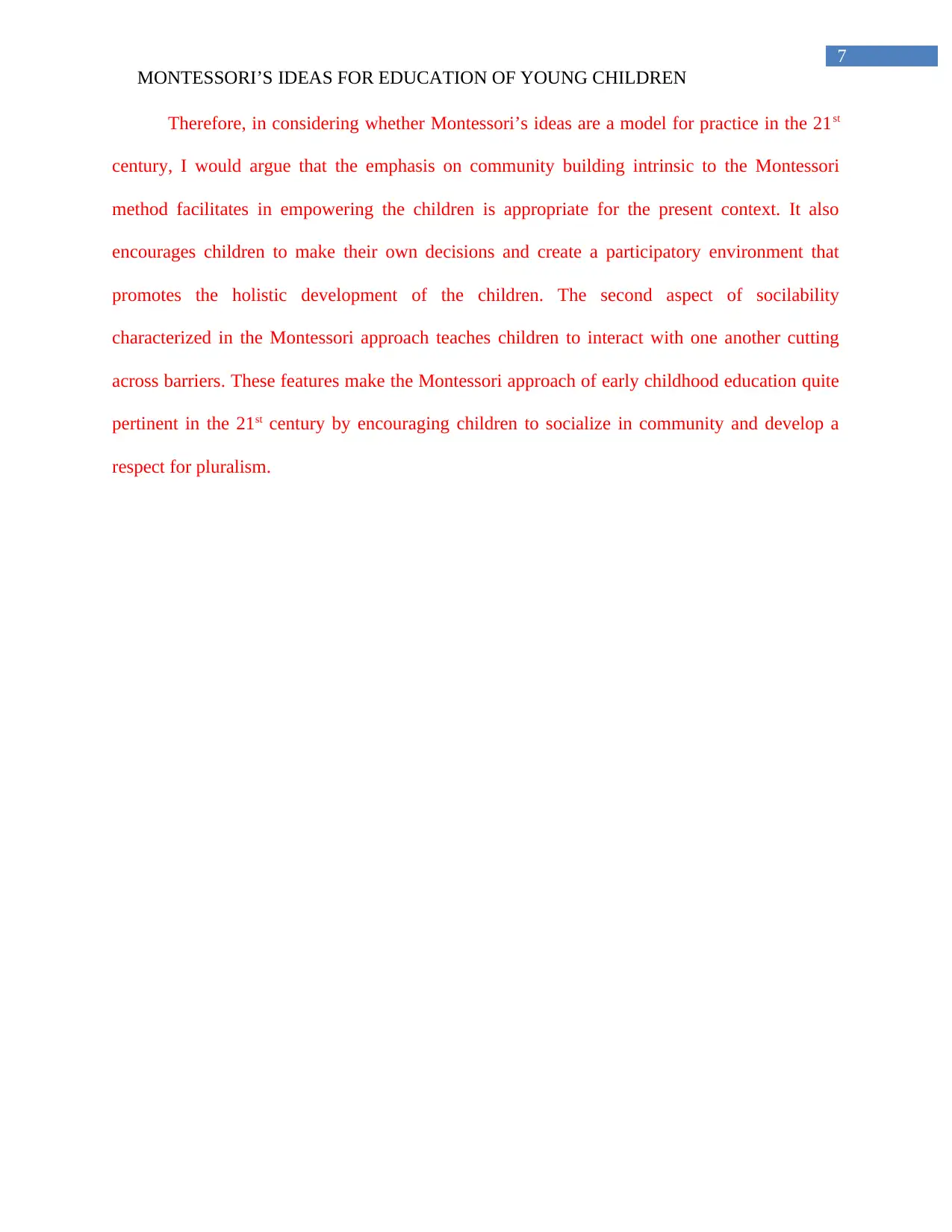
7
MONTESSORI’S IDEAS FOR EDUCATION OF YOUNG CHILDREN
Therefore, in considering whether Montessori’s ideas are a model for practice in the 21st
century, I would argue that the emphasis on community building intrinsic to the Montessori
method facilitates in empowering the children is appropriate for the present context. It also
encourages children to make their own decisions and create a participatory environment that
promotes the holistic development of the children. The second aspect of socilability
characterized in the Montessori approach teaches children to interact with one another cutting
across barriers. These features make the Montessori approach of early childhood education quite
pertinent in the 21st century by encouraging children to socialize in community and develop a
respect for pluralism.
MONTESSORI’S IDEAS FOR EDUCATION OF YOUNG CHILDREN
Therefore, in considering whether Montessori’s ideas are a model for practice in the 21st
century, I would argue that the emphasis on community building intrinsic to the Montessori
method facilitates in empowering the children is appropriate for the present context. It also
encourages children to make their own decisions and create a participatory environment that
promotes the holistic development of the children. The second aspect of socilability
characterized in the Montessori approach teaches children to interact with one another cutting
across barriers. These features make the Montessori approach of early childhood education quite
pertinent in the 21st century by encouraging children to socialize in community and develop a
respect for pluralism.
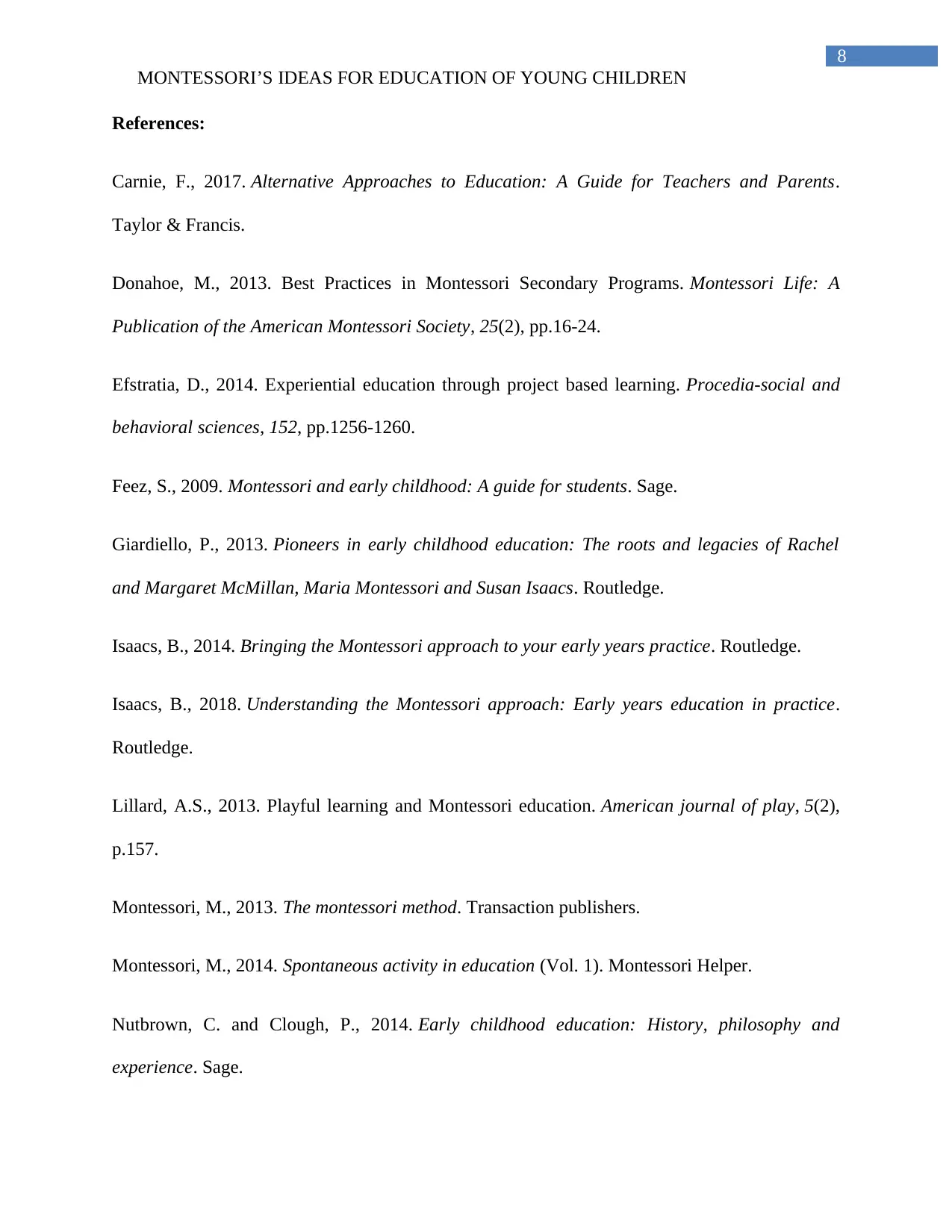
8
MONTESSORI’S IDEAS FOR EDUCATION OF YOUNG CHILDREN
References:
Carnie, F., 2017. Alternative Approaches to Education: A Guide for Teachers and Parents.
Taylor & Francis.
Donahoe, M., 2013. Best Practices in Montessori Secondary Programs. Montessori Life: A
Publication of the American Montessori Society, 25(2), pp.16-24.
Efstratia, D., 2014. Experiential education through project based learning. Procedia-social and
behavioral sciences, 152, pp.1256-1260.
Feez, S., 2009. Montessori and early childhood: A guide for students. Sage.
Giardiello, P., 2013. Pioneers in early childhood education: The roots and legacies of Rachel
and Margaret McMillan, Maria Montessori and Susan Isaacs. Routledge.
Isaacs, B., 2014. Bringing the Montessori approach to your early years practice. Routledge.
Isaacs, B., 2018. Understanding the Montessori approach: Early years education in practice.
Routledge.
Lillard, A.S., 2013. Playful learning and Montessori education. American journal of play, 5(2),
p.157.
Montessori, M., 2013. The montessori method. Transaction publishers.
Montessori, M., 2014. Spontaneous activity in education (Vol. 1). Montessori Helper.
Nutbrown, C. and Clough, P., 2014. Early childhood education: History, philosophy and
experience. Sage.
MONTESSORI’S IDEAS FOR EDUCATION OF YOUNG CHILDREN
References:
Carnie, F., 2017. Alternative Approaches to Education: A Guide for Teachers and Parents.
Taylor & Francis.
Donahoe, M., 2013. Best Practices in Montessori Secondary Programs. Montessori Life: A
Publication of the American Montessori Society, 25(2), pp.16-24.
Efstratia, D., 2014. Experiential education through project based learning. Procedia-social and
behavioral sciences, 152, pp.1256-1260.
Feez, S., 2009. Montessori and early childhood: A guide for students. Sage.
Giardiello, P., 2013. Pioneers in early childhood education: The roots and legacies of Rachel
and Margaret McMillan, Maria Montessori and Susan Isaacs. Routledge.
Isaacs, B., 2014. Bringing the Montessori approach to your early years practice. Routledge.
Isaacs, B., 2018. Understanding the Montessori approach: Early years education in practice.
Routledge.
Lillard, A.S., 2013. Playful learning and Montessori education. American journal of play, 5(2),
p.157.
Montessori, M., 2013. The montessori method. Transaction publishers.
Montessori, M., 2014. Spontaneous activity in education (Vol. 1). Montessori Helper.
Nutbrown, C. and Clough, P., 2014. Early childhood education: History, philosophy and
experience. Sage.
⊘ This is a preview!⊘
Do you want full access?
Subscribe today to unlock all pages.

Trusted by 1+ million students worldwide
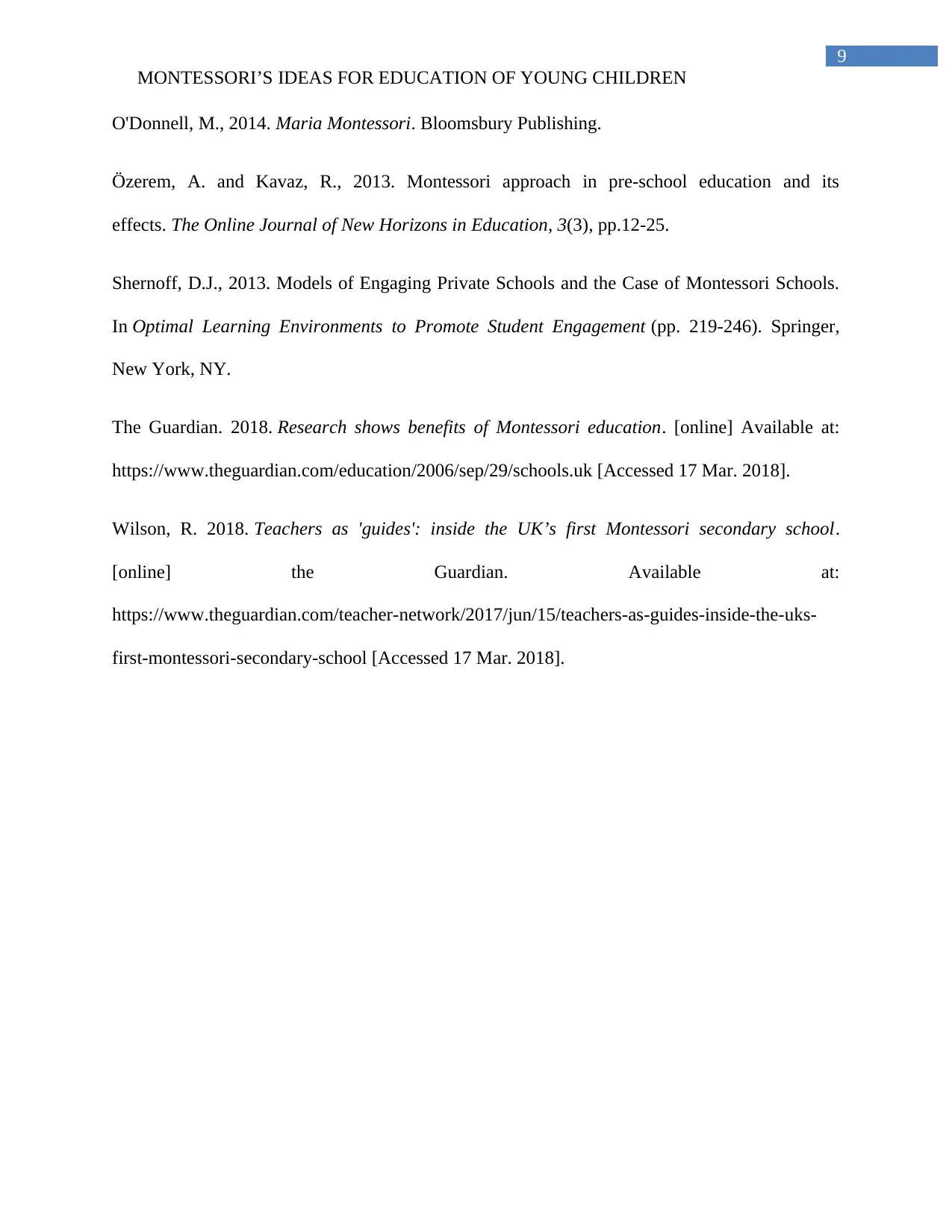
9
MONTESSORI’S IDEAS FOR EDUCATION OF YOUNG CHILDREN
O'Donnell, M., 2014. Maria Montessori. Bloomsbury Publishing.
Özerem, A. and Kavaz, R., 2013. Montessori approach in pre-school education and its
effects. The Online Journal of New Horizons in Education, 3(3), pp.12-25.
Shernoff, D.J., 2013. Models of Engaging Private Schools and the Case of Montessori Schools.
In Optimal Learning Environments to Promote Student Engagement (pp. 219-246). Springer,
New York, NY.
The Guardian. 2018. Research shows benefits of Montessori education. [online] Available at:
https://www.theguardian.com/education/2006/sep/29/schools.uk [Accessed 17 Mar. 2018].
Wilson, R. 2018. Teachers as 'guides': inside the UK’s first Montessori secondary school.
[online] the Guardian. Available at:
https://www.theguardian.com/teacher-network/2017/jun/15/teachers-as-guides-inside-the-uks-
first-montessori-secondary-school [Accessed 17 Mar. 2018].
MONTESSORI’S IDEAS FOR EDUCATION OF YOUNG CHILDREN
O'Donnell, M., 2014. Maria Montessori. Bloomsbury Publishing.
Özerem, A. and Kavaz, R., 2013. Montessori approach in pre-school education and its
effects. The Online Journal of New Horizons in Education, 3(3), pp.12-25.
Shernoff, D.J., 2013. Models of Engaging Private Schools and the Case of Montessori Schools.
In Optimal Learning Environments to Promote Student Engagement (pp. 219-246). Springer,
New York, NY.
The Guardian. 2018. Research shows benefits of Montessori education. [online] Available at:
https://www.theguardian.com/education/2006/sep/29/schools.uk [Accessed 17 Mar. 2018].
Wilson, R. 2018. Teachers as 'guides': inside the UK’s first Montessori secondary school.
[online] the Guardian. Available at:
https://www.theguardian.com/teacher-network/2017/jun/15/teachers-as-guides-inside-the-uks-
first-montessori-secondary-school [Accessed 17 Mar. 2018].
1 out of 10
Related Documents
Your All-in-One AI-Powered Toolkit for Academic Success.
+13062052269
info@desklib.com
Available 24*7 on WhatsApp / Email
![[object Object]](/_next/static/media/star-bottom.7253800d.svg)
Unlock your academic potential
Copyright © 2020–2026 A2Z Services. All Rights Reserved. Developed and managed by ZUCOL.





